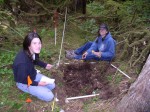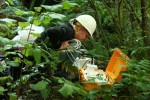REUs study soil and climate change effects...
In summer 2007, the Andrews Forest LTER Program hosted Research for Undergraduate (REU) students Farm Saechao and Julia Pederson.
Saechao, a senior at Oregon State University's (OSU) College of Health and Human Sciences, did her REU project on effects of climate change on rural communities. She worked under the supervision of Brent Steel, Professor in OSU's Department of Political Science. Saechao helped to identify indicators used to assess a community's ability to adapt to changes such as natural disasters. She visited rural communities in Oregon and spoke with city managers about current conditions of their cities and plans for changes. Says Saechao, "After working on this project I feel like graduate school is more of a possibility." Pederson, a senior at OSU in Crop and Soil Science, did an REU project on how mycorrhizal mats contribute to forest soil carbon dioxide production. She worked under the supervision of OSU Forest Science PhD student Claire Philips and OSU Forest Science Professor Barbara Bond. Pederson reported that, "carrying out this experiment to completion was helpful to me as an undergraduate interested in pursuing a career in soil science. I was able to experience a little bit of what it is like to be a graduate student."
By Lina DiGregorio, AND
...others go wireless
The science of mountain airsheds in the H.J. Andrews Experimental Forest LTER requires a strong back and a sharp mind-especially when you're lugging a 65-pound golf-cart battery in your backpack.
An interdisciplinary team of Oregon State University students is working to make science easier on the back and on the environment. The three seniors-Drew Smith, Erin Wyckoff and Brian Wilson-spent 10 weeks scaling the steep slopes in the Andrews Forest, pooling their individual expertise in electrical engineering, soil science, and atmospheric science to test and refine a networked wireless and battery-free system for monitoring what OSU's Terra magazine (http://oregonstate.edu/terra/2007summer/includes/grasping-air.pdf) calls the "exhaled byproducts of the forest." The students are helping unplug the high-tech sensors that researchers use to measure the ebb and flow of carbon-laden air, connecting them instead through a new generation of ultra-low-power sensing devices that save energy and vastly extend the range of existing equipment in mountainous terrain.
Thanks to their efforts, which is funded by the National Science Foundation REU program, the miles of electric wire that currently snake through the experimental watershed in glistening black tangles may one day be relegated to the dustbin of technology.
For full story, please see: http://oregonstate.edu/terra/2007summer/departments/student-research/cyberforest-unplugged.html.

 Enlarge this image
Enlarge this image
